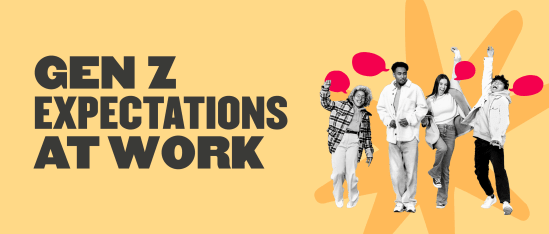The world of work is evolving—and Gen Z is the catalyst for change.
As this generation’s influence grows, their unique values, work habits, and expectations are reshaping organizational culture.
This was the core theme of a recent HiBob webinar, where industry experts shared insights into how Gen Z is driving workplace transformation.
The panel
Jacob Morgan, a five-time bestselling author and future of work expert, led the webinar panel, joined by Keren Kozar, Senior People and Culture Partner at HiBob, with expertise in managing multi-generational teams, and Melanie Wertzberger, a Gen Z thought leader and researcher who has surveyed over a thousand Gen Z professionals.
Together, they discussed the values, work habits, and expectations Gen Z brings to the workplace, and how businesses can adapt to these new paradigms.
Read on as we dive into the webinar’s insights on how Gen Z is reshaping workplace culture, redefining productivity, and challenging traditional leadership styles—paving the way for a more dynamic and inclusive future of work.
Understanding Gen Z’s expectations in the workplace
Gen Z is set to make up 30 percent of the workforce by 2030, but they’re already redefining workplace expectations with fresh perspectives and priorities.
Rather than simply adapting to traditional working norms, this generation actively challenges and transforms them, bringing fresh perspectives on productivity, work-life balance, and career development.
Let’s start by exploring three key themes surrounding Gen Z’s workplace expectations:
Gen Z work-life balance priorities
Gen Z recognizes how our digitally connected world has blurred the boundaries between work and personal life.
As HiBob’s Keren Kozar observes in the webinar, “We’re in 2024… there is no work-life balance. It’s a blend; work comes into home, and home into work.” Gen Z values workplaces that understand this reality and actively support a healthy balance, viewing it as vital to their satisfaction and well-being.
In fact, 74 percent of Gen Z are willing to change jobs for a better work-life balance—significantly more than Millennials or Gen X. Prioritizing this balance is a powerful way to boost retention and create a more engaged team.
Recommended For Further Reading
Technology and productivity redefined
With 70 percent of Gen Zers willing to switch jobs for better technology, it’s clear that modern tools are essential to their work experience.
Gen Z brings a technology-first mindset to the workplace, effortlessly adapting to digital tools that streamline workflows and bring fresh, innovative approaches.
To fully support this working style, businesses should create tech-driven environments that boost productivity and flexibility, attracting and retaining Gen Z talent while building a workplace that thrives on modern solutions.
Career development expectations
Gen Z brings fresh expectations for career growth, driven by a desire for roles that offer both progress and flexibility.
HiBob’s research reveals that 27 percent of Gen Zers cite “future potential” as their main reason for joining a company and 37 percent stay primarily for promotion opportunities.
However, as Melanie explains in the webinar, this generation also seeks diverse experiences throughout their careers, with 78 percent wanting to engage in projects outside their standard role, according to her research.
As such, Gen Z values clear career paths but prefers them to be flexible, allowing for varied growth and skill development.
Encouraging both career progression and broader skill development helps businesses build teams with diverse talent, primed to adapt and spark fresh forward-thinking ideas.
Gen Z’s impact on leadership and culture
Gen Z is driving changes in leadership styles and organizational culture. Traditional top-down management is evolving to more collaborative, development-focused approaches that align with this generation’s expectations.
Leaders are encouraged to foster environments that support growth, adaptability, and meaningful engagement, reflecting the values Gen Z brings to the workplace.
The following webinar themes center on Gen Z’s influence on organizational leadership and company culture:
Flattening hierarchies and building relationships
Flattened hierarchies focus on creating relationship-driven environments where leaders and team members work closely together. This is a natural fit for Gen Z, as over half (52 percent) show little interest in middle management roles, preferring career paths centered on personal growth and skill-building.
By minimizing rigid organizational structures, flattened hierarchies offer the transparency, regular feedback, and genuine inclusion that Gen Z values, making work feel purposeful and growth-oriented.
The evolution of leadership styles
To unlock Gen Z’s full potential, modern leaders must ditch outdated command-and-control tactics and instead adopt coaching-focused approaches that motivate this dynamic generation.
As Jacob Morgan describes perfectly in the webinar, leaders need to become more like “travel agents” for their team members’ careers, “helping your people go on these exciting journeys and destinations… getting to know your people as individuals as human beings instead of just as employees.”
Building inclusive cultures
Gen Z is the most diverse generation to enter the workforce—48 percent identify as racially or ethnically diverse, compared to 39 percent of Millennials. Their expectations surrounding diversity and inclusion are a non-negotiable part of choosing where to work.
However, building inclusive cultures that genuinely reflect Gen Z’s expectations goes beyond diversity data. It’s about embedding inclusivity into everyday interactions, decision-making, and leadership practices.
Crucially, these commitments demand authenticity. Gen Zers are quick to spot “check-the-box” approaches and value workplaces that make inclusion a core part of culture.
The role of technology in Gen Z’s workplace experience
People often stereotype Gen Z as a purely digital generation, but the webinar reveals a more nuanced reality about their relationship with technology and workplace tools.
In many cases, Gen Z desires face-to-face interaction and teamwork, challenging common assumptions about how this generation wants to work.
Here are three webinar insights that explore the nuanced relationship between Gen Z and technology:
Digital natives, but not digital exclusive
While the Gen Z demand for flexible work is accelerating the trend toward remote and hybrid workplaces, the idea that Gen Z prefers purely digital interactions overlooks some important points.
According to HiBob’s YGIT report, and contrary to popular belief, 41 percent of Gen Z professionals actually feel more engaged and motivated in the office and 37 percent express concerns about missing opportunities to connect with colleagues.
The desire for human connection complements digital strengths. Gen Z perceives technology as a tool to enhance, not replace, workplace relationships.
Digital communication is the glue between hybrid and remote teams
For Gen Z, instant messaging isn’t just a tool—it’s a way of life.
Having grown up in an always-connected world, they bring an intuitive understanding of how digital communication can support collaboration, especially in remote and hybrid settings.
Gen Z collaboration in the workplace relies heavily on platforms like Slack and Teams, which enable real-time feedback, transparency, and fluid communication.
These tools are essential for effective teamwork in today’s distributed workplaces, enabling seamless collaboration across time zones and locations—without the clutter of endless email chains.
Technology as an efficiency driver
Gen Z’s relationship with technology centers on maximizing productivity and enabling meaningful work.
As Melanie explains in the webinar, “To Gen Z, they might be able to output the amount of work using technology that someone else was doing in 50 hours at the beginning of their careers.”
If their teams are pumping out more work per hour, organizations need to respect and reward it, whether through flexible schedules, four-day workweeks, or efficient handling of time-off requests.
Practical strategies for engaging Gen Z talent
As we consider how to implement strategies for engaging Gen Z, the key lies in first understanding what makes this generation tick.
Gen Z craves authenticity, purpose, and continuous growth. They want to work for organizations that align with their values and provide opportunities to make a real impact.
So, how can HR professionals create a workplace that attracts and retains this generation’s talent while harnessing their strengths to drive innovation and growth?
There are three primary domains to focus on:
Creating purpose-driven cultures
Gen Z is a purpose-driven generation. They want to work for organizations that make a positive difference in the world.
Thus, it’s essential to clearly articulate your organization’s mission and values and demonstrate a commitment to making a meaningful impact.
By creating a culture that prioritizes purpose and impact, you’ll not only attract Gen Z talent but also inspire them to bring their best selves to work every day.
Fostering open communication
Gen Z craves authenticity and transparency in both communication and feedback.
As Keren from HiBob explains in the webinar, development happens through “those everyday radical candor moments where you’re just constantly coaching your team members and you create that relationship.”
Remember, open communication is a two-way street. By actively listening to your Gen Z team members and responding with empathy and action, you’ll build trust and create a strong foundation for engagement and retention.
Investing in continuous learning and development
Learning and development are top priorities for Gen Z. Organizations must provide ample growth opportunities, both within and outside their primary roles.
Keren recommends, “The more that we can tap into skills-based projects that expand beyond your job description, the more employees are going to feel like the company’s investing in me.”
Focus on understanding Gen Z’s skills and how they can apply these abilities across different roles and projects rather than limiting them to narrowly defined tasks.
Embracing Gen Z’s influence in the workplace
Gen Z is redefining the future of work, bringing bold expectations and opportunities for progress.
Companies that embrace this generation’s culture, values, and skills position themselves to attract top talent and build a workplace that’s innovative, inclusive, and ready for the challenges of tomorrow.
For HR professionals and leaders, this is a moment to build adaptable, engaging, and genuinely people-focused workplaces.
Start by assessing your practices and actively involving Gen Z team members in shaping processes. Seeking their feedback and involving them in decisions sends a clear message: their voices matter, and the organization is ready to evolve.
For the full story on Gen Z’s impact, check out the webinar, “Vibe check: How Gen Z is transforming workplace dynamics in 2024,” by clicking here.


